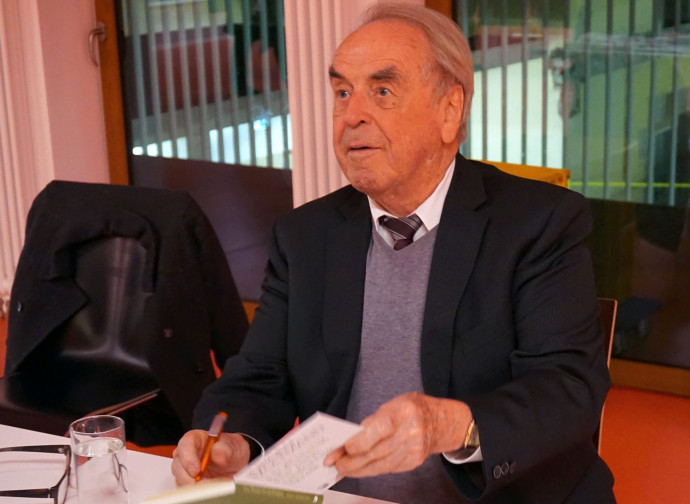Moltmann, the father of errors of contemporary theology
The Protestant theologian also had great influence in Catholic circles. A negative influence, which relies on hope but places it within history, secularising faith. The results are still evident today.

.On 3 June the Protestant theologian Jürgen Moltmann died in Tübingen at the age of 98. He is usually remembered as ‘the theologian of hope’ because of his main work Theology of Hope, published in 1964. It is neither wrong nor reductive to remember him for that volume because his intention was not to deal with one chapter of theology, namely hope, but to re-formulate theology in its entirety.
From hope he derived a new explanation of all the traditional theological themes: revelation understood not so much in its doctrinal character as in its historical character, transcendence understood in a temporal sense as future rather than in a spatial sense, sin as the rejection of hope, grace as the gift of the possibility and capacity to hope, conversion as aversion to the present and conversion to the future. Hence the revolutionary impact of his theology, linked to the all-Protestant idea of the world come of age, of secularisation as a Christian phenomenon, of the need to move towards a secular theology, as Harvey Fox would also argue with his book The Secular City a year later in 1965. History, hope, future, praxis: these are the coordinates of the new theology that we find in all subsequent theology, including Catholic theology.
In both the Old and New Testaments, according to Moltmann, God is not understood as a consecration of times and places but connected with a word of promise. The promise binds man to the history that stands between the promise and its fulfilment. This is the space for human responsibility, for the future, morality and praxis. The theology of hope is elaborated in an eschatological key, henceforth entrusting the theologian not with the task of ‘interpreting the world, history and human nature, but of transforming them in expectation of a divine transformation’. The place of God's revelation becomes history, and God reveals himself through historical promises and historical events, beginning with the Exodus. The Christian's task is not so much to ask who God is and what His attributes are, but to identify where God is at work in history and to actively participate in His work of redemption. It was necessary to eliminate all metaphysical dualism and all spatial views of God, to create a secular theology out of political language: ‘this implies that we discern where God is at work, and thus join in His work: this incessant action is a way of speaking: in doing so, the Christian speaks of God’. Truth becomes action. Who God is will not be told by the theologian through speeches, but by the praxis of Christians.
With Moltmann, the dimension of history enters theology and subverts its connotations. The aforementioned Harvey Fox will approach the theology of hope and argue that ‘God loves the world and not the Church’ and uses the world and not the Church, and in his book The Christian as Rebel notes that ‘professional baseball and not the Church had taken the first steps towards racial integration. We are way behind in this whole matter. We have to race to catch up with what God is already doing in the world'. As we can see, the “outgoing” Church has distant origins. Moltmann's new suggestions will be taken up by Johann Baptist Metz in his ‘Political Theology’ and Karl Rahner will also make the same assumptions his own, starting with secularisation, which requires us to think that God's revelation takes place in human history before it takes place in the Church. One could think that the real innovative turning point in contemporary theology was brought about by Moltmann. All other theologies would in fact follow the path inaugurated by him. The Theology of Hope can thus be compared to a catalyst that provoked others in a chain reaction. He was able to deal with revolutionary and liberation theology, he baptised black theology and feminist theology. Moreover, he was at the centre of the dialogue between Christians and Marxists.
This last cue leads us to another important chapter in the Moltmann story. I refer to the dialogue with the thought of the East German Marxist philosopher Ernst Bloch, which had so much influence on Moltmann's theology and later theology. Bloch's Hope Principle and Moltmann's Theology of Hope refer to each other. Bloch reformulates Marxism under the category of utopia, he sees all reality as governed by the future and driven to overcome itself, he reads the Bible as an expression of a ‘transcendence without transcendence’, the future and history are as much the characteristics of the Christian religion as they are of this secularised world, the God of Israel is the God of the eighth day ‘who has not yet been and is therefore more authentic’ and Christ has nothing spiritual, but is the man who sat not at the right hand of God but at his place because Christianity is liberating and therefore atheistic. In this way, Moltmann meets not only with Marxism but with the atheistic nihilism of modernity.
To pass judgement on Moltmann's theology entails also passing judgement on much of contemporary theology. To celebrate his thought by extolling it would be to endorse the great errors of this theology and those that followed. This article is limited to recalling some basic assumptions. The reader, if they feel so inclined, can try themselves to identify their negative effects on the theology of these decades and also on the praxis of the Church today.
